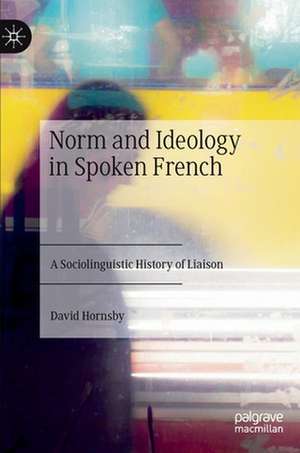Norm and Ideology in Spoken French: A Sociolinguistic History of Liaison
Autor David Hornsbyen Limba Engleză Hardback – 20 oct 2020
This volume offers a diachronic sociolinguistic perspective on one of the most complex and fascinating variable speech phenomena in contemporary French. Liaison affects a number of word-final consonants which are realized before a vowel but not pre-pausally or before a consonant. Liaisons have traditionally been classified as obligatoire (obligatory), interdite (forbidden) and facultative (optional), the latter category subject to a highly complex prescriptive norm. This volume traces the evolution of this norm in prescriptive works published since the 16th Century, and sets it against actual practice as evidenced from linguists’ descriptions and recorded corpora. The author argues that optional (or variable) liaison in French offers a rich and well-documented example of language change driven by ideology in Kroch’s (1978) terms, in which an elite seeks to maintain a complex conservative norm in the face of generally simplifying changes led by lower socio-economic groups, who tend in this case to restrict liaison to a small set of traditionally obligatory environments.
| Toate formatele și edițiile | Preț | Express |
|---|---|---|
| Paperback (1) | 579.67 lei 43-57 zile | |
| Springer International Publishing – 21 oct 2021 | 579.67 lei 43-57 zile | |
| Hardback (1) | 585.08 lei 43-57 zile | |
| Springer International Publishing – 20 oct 2020 | 585.08 lei 43-57 zile |
Preț: 585.08 lei
Preț vechi: 688.33 lei
-15% Nou
Puncte Express: 878
Preț estimativ în valută:
111.99€ • 121.69$ • 94.13£
111.99€ • 121.69$ • 94.13£
Carte tipărită la comandă
Livrare economică 21 aprilie-05 mai
Preluare comenzi: 021 569.72.76
Specificații
ISBN-13: 9783030492991
ISBN-10: 3030492990
Pagini: 193
Ilustrații: XVI, 230 p. 80 illus., 1 illus. in color.
Dimensiuni: 148 x 210 mm
Greutate: 0.45 kg
Ediția:1st ed. 2020
Editura: Springer International Publishing
Colecția Palgrave Macmillan
Locul publicării:Cham, Switzerland
ISBN-10: 3030492990
Pagini: 193
Ilustrații: XVI, 230 p. 80 illus., 1 illus. in color.
Dimensiuni: 148 x 210 mm
Greutate: 0.45 kg
Ediția:1st ed. 2020
Editura: Springer International Publishing
Colecția Palgrave Macmillan
Locul publicării:Cham, Switzerland
Cuprins
Part 1: Models.- Chapter 1: Ideology and Language Change.- Chapter 2: What is Liaison?.- Part 2: Historical Perspectives on a Prescriptive Norm.- Chapter 3: A Brief History of French Final Consonants.- Chapter 4: An Evolving Norm: Liaison in Prescriptive Grammar.- Part 3: Variation and Change.- Chapter 5: Liaison and Geography.- Chapter 6: Liaison and Social Factors.- Chapter 7: The Four Cities Project.- Chapter 8: Professionnels de la Parole Publique.- Part 4: Conclusions and Implications.- Chapter 9: An Inverse Sociolinguistic Perspective?
Notă biografică
David Hornsby is a Senior Lecturer in French at the University of Kent, UK.
Textul de pe ultima copertă
This volume offers a diachronic sociolinguistic perspective on one of the most complex and fascinating variable speech phenomena in contemporary French. Liaison affects a number of word-final consonants which are realized before a vowel but not pre-pausally or before a consonant. Liaisons have traditionally been classified as obligatoire (obligatory), interdite (forbidden) and facultative (optional), the latter category subject to a highly complex prescriptive norm. This volume traces the evolution of this norm in prescriptive works published since the 16th Century, and sets it against actual practice as evidenced from linguists’ descriptions and recorded corpora. The author argues that optional (or variable) liaison in French offers a rich and well-documented example of language change driven by ideology in Kroch’s (1978) terms, in which an elite seeks to maintain a complex conservative norm in the face of generally simplifying changes led by lower socio-economic groups, who tend in this case to restrict liaison to a small set of traditionally obligatory environments.
David Hornsby is a Senior Lecturer in French at the University of Kent, UK.
Caracteristici
Offers an in-depth and wide-ranging examination of liaison, a key variable phenomenon in spoken French Takes into account both contemporary theories of language ideology and language variation and change, as well as corpus data Addresses new and emerging areas such as the current discussion of diglossia in French Tests evidence for French exceptionalism in respect of sociolinguistic theory Considers liaison from both diachronic and synchronic perspectives
